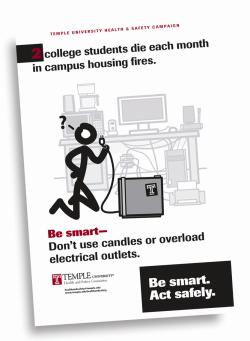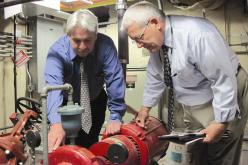Fire safety always a hot topic
|
While September is officially recognized as National Campus Fire Safety Month, Temple strives to make fire safety and prevention a year-round effort for its students, faculty and employees, both on and off-campus. Led by Temple’s Health and Safety Committee, a fire safety campaign has begun, with posters hung in strategic locations across campus to remind students living in both on- and off-campus housing to “Be smart — Don’t use candles or overload electrical outlets.” “The role of the Health and Safety Committee is to providetimely, relevanteducation and information onvarious health and safety issues — such as fire safety — for students, faculty, staff, and visitors,” said Deborah Hartnett, vice president of Human Resources and the group’s chair. “We are committed to encouraging people to think before they act in order to live safely.” |
 |
|
“A fire can go out of control in as little as 30 seconds,” she said. “Even though people can be prepared to react quickly and appropriately to a fire, it’s more important to ensure that the conditions that precipitate the fire never occur — which is why we have begun this informational campaign.” According to Campus Firewatch, from January 2000 through August 2009 there were 135 fire fatalities nationwide in residence halls, Greek housing or off-campus housing. The Center for Campus Fire Safety attributes the majority of campus-related fire fatalities to accidents from cooking, candles, smoking or electrical overload/malfunction. According to Temple Fire Marshal John Maule, there were no reported fires in any of the university’s student housing in 2008. There was one reported in 2007 and two in 2006, with no related injuries in any of the incidents. |
|
 Preston M. Moretz/Temple University
University Fire Marshal John Maule (left) and Corporate Fire Marshal John Higgins inspect a fire sprinkler system pump in the basement of Conwell Hall. Maule and Higgins work year-round on the university’s fire safety and prevention efforts, which includes the inspection and maintenance of the university’s fire alarm systems, sprinkler systems and fire extinguishers.
|
At Temple, the Office of the Fire Marshal, which is part of Facilities Management, works year-round with university departments and committees to promote a fire-safe environment. Their work includes training resident directors, resident assistants and staff in University Housing and Residential Life in fire safety and prevention; training facilities employees on preventing potential fire hazards; working with the Environmental Health and Radiation Safety Committee; inspecting buildings and fire extinguishers; and working with contractors to maintain the university’s fire alarm and sprinkler systems. “We have 50 sprinkler systems just on the main campus alone,” said Maule, who spent 30 years with the Philadelphia Fire Department before joining Temple six years ago. “All the alarm systems, all the sprinkler systems and all the fire extinguishers have to be inspected every year.” |
|
Corporate Fire Marshal John Higgins, who spent 24 years with Philadelphia’s Department of Licenses and Inspections before joining Temple last May, says one of the main messages they stress to everyone on campus is when a fire alarm activates, evacuate the building as quickly as possible using the nearest exit, whether it is a fire drill, false alarm or actual fire. “That’s one of the biggest problems we have,” said Higgins. “People don’t use the emergency exits in these situations, but it is OK to go out these exits if the fire alarms are going off.” He also reminds everyone — students, faculty and staff — that certain items are banned from all university buildings because they pose potential fire hazards. These items include candles, hot plates, portable heaters, extension cords, halogen lamps, live Christmas trees, ceiling tapestries and heat generating appliances. Smoking is also forbidden in all buildings. Another big problem for all colleges and universities regarding fire safety is off-campus housing, said Maule. Since 2000, 84 percent of campus-related fire fatalities have taken place in off-campus housing, according to Campus Firewatch. Although University Housing and Residential Life works with approved landlords in the surrounding community and inspects off-campus housing, Maule said his office would also inspect any off-campus housing for potential fire hazards, fire alarm and extinguishing systems and help develop evacuation plans upon request. Contact the fire marshal’s office at 215-204-7938 to schedule an appointment. Finally, in an effort to maintain the integrity of the university’s fire extinguishing systems, Maule warns students against tampering with sprinkler heads in any of the residence halls. “Students tend to hang things on them or if they’re throwing things around in their room or the hallways they might hit and damage them,’ he said. “Water comes out of those things at 20 gallons-per-minute and they’re not that easy to shut off. A broken sprinkler head can easily do thousands of dollars worth of damage.” |
|